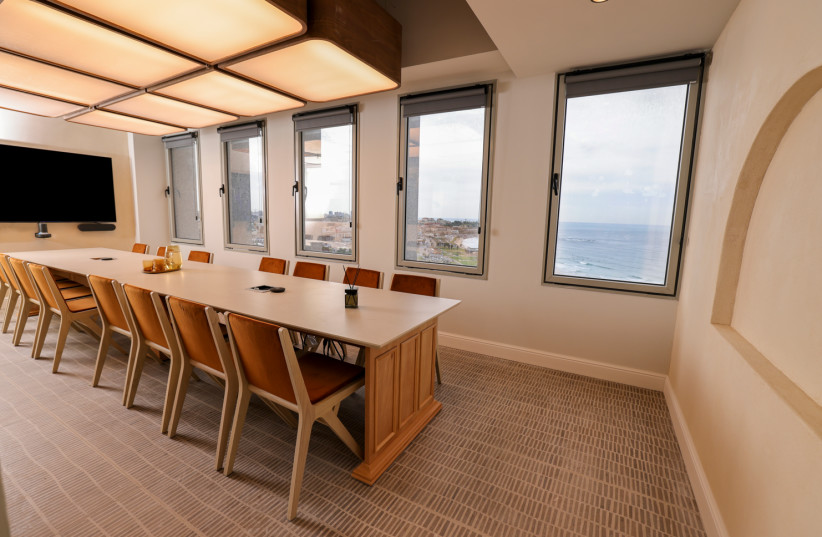In recent years, the concept of collaborative workspaces has gained significant attention among businesses of all sizes. As more and more companies move towards a more flexible and collaborative work culture, collaborative workspaces are becoming increasingly important. A 2020 study by global real estate services company JLL predicts that collaborative workspaces will make up 30% of all office space by 2030, meaning that the future for companies such as Mindspace and WeWork is looking pretty healthy.
Another player in the flexible workplace industry is ROOMS, a more intimate shared office space provider which offers businesses the opportunity to work in an environment that is both office-level professional while maintaining a hotel-like aesthetic.
In response to the growing interest in flexible workspaces, ROOMS intends to capitalize upon the situation by launching another office location in May, adding to its roster of 10 existing locations — several of which were built or expanded in recent months due to demand.
ROOMS’ CEO Nadav Fatal explained that the increasing demand for flexible workspaces was exacerbated by the market uncertainty delivered by the 2020 pandemic. “Shortly after we officially came out of the corona crisis huge demands began and we noticed that the uncertainty strengthened the demand for co-working spaces. This phenomenon continues and gets stronger to this day,” he said.
“Shortly after we officially came out of the corona crisis huge demands began and we noticed that the uncertainty strengthened the demand for co-working spaces. This phenomenon continues and gets stronger to this day.”
Nadav Fatal
While the promise of “hotel-like” is perhaps an exaggeration, ROOMS’ facility in Tel Aviv overlooks the seafront and offers all of the expected amenities, such as shared sitting areas, a tidy kitchen and sound-proofed rooms for taking private calls, as well as larger segments of walled offices available for rent by small start-ups seeking a consistent place to work from without the hassle of managing their office property themselves.

A frequently-stocked pantry and prompt cleaning schedule also lends itself to a quality working experience, and the modern décor, lighting and softly piped-in mid-2000s pop music are far from offensive additions to an office work environment.
Flexible offices enabling hard work
The rise of collaborative workspaces can be attributed to a number of factors, including the growing trend towards remote work, the need for flexible working arrangements and the desire for a more dynamic and engaging work environment.
Collaborative workspaces offer businesses the opportunity to create a culture of collaboration and innovation, which in turn can lead to increased productivity, better decision-making and better business outcomes.
According to a study carried out by McKinsey, 98 million workers in the United States opt to work remotely, and a study by Deloitte has found that over three quarters of respondents’ decision to switch jobs was driven by a desire for greater workplace flexibility.
Another reason to consider a shared office is the potential reduction in cost and management load.
Tomer Midad, Vice President of Research and Development at travel-tech service provider Travel Booster, noted that in many cases just operating to execute on a company’s core concept can be enough to keep everyone’s hands full.
"Building a technological system internally may seem like a cost-effective solution, but it can quickly turn into a process that consumes a lot of time and resources. Many companies in the economy prefer to purchase services from an external company that specializes in the field and provides a complete end-to-end solution.”
Tomer Midad
"Building a technological system internally may seem like a cost-effective solution, but it can quickly turn into a process that consumes a lot of time and resources. Many companies in the economy prefer to purchase services from an external company that specializes in the field and provides a complete end-to-end solution,” said Midad.
He noted that a growing number of Travel Booster’s customers operate from collaborative workspaces — indicating a correlation between companies which attempt to bring down overheads by working in a shared environment and those that attempt to reduce expenditure by outsourcing services like IT and logistics management. As a result of this, we may see an increase in demand for services which take over a start-up’s extraneous tasks and allow them to, as Midad put it, “take advantage of their time and focus on the company's current core activities.”
Alon Ben Nun, the Director of Tech and Offshore Solutions for IT service provider Aman Group, echoed Midad’s sentiment, noting that fluctuating macro- and microeconomic events can present a challenge to growing companies.
“Business conflicts arise where, on the one hand, there is a need for continued technological development and expansion, and on the other hand are [market] pressures which force organizations to do more for less money,” he said. The issues in the latter hand, he added, “Are the ones which ultimately push organizations to [enlist outsourced] service companies.”
